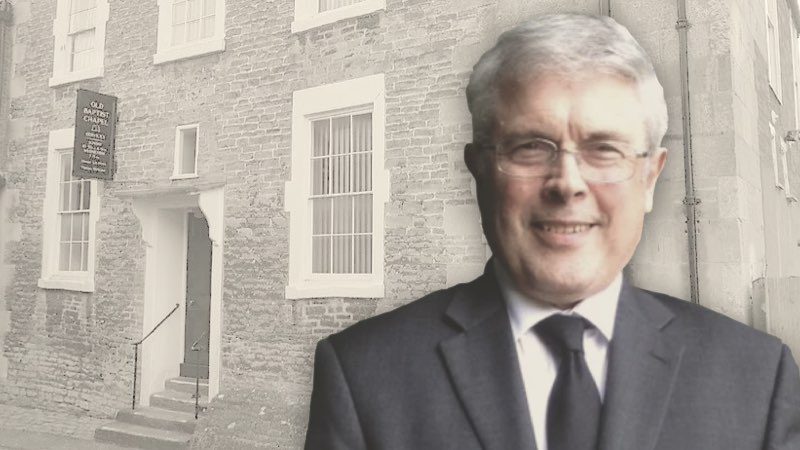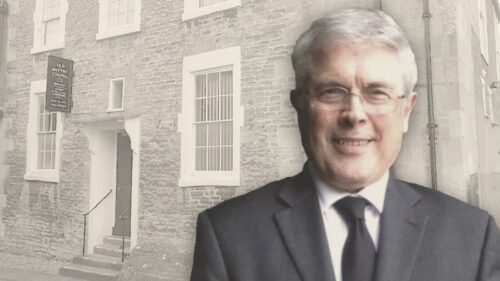
The Lord Reigneth
[Posted by permission. Chippenham Old Baptist Chapel.]
Prayer Meeting Address given at Old Baptist Chapel, Chippenham by Mr. G. D. Buss on Wednesday evening, 18th March, 2020
“The LORD reigneth; let the people tremble: He sitteth between the cherubims; let the earth be moved. The LORD is great in Zion; and He is high above all the people.”—Psalm 99:1, 2
When King Solomon got up to pray on that momentous occasion at the dedication of the Temple, he was undoubtedly inspired by God the Holy Spirit in that prayer which he uttered before the Lord. And it is very instructive to notice that the very things that Solomon prayed for, came to pass in the history of God’s ancient people. In other words, the Holy Ghost, directing his prayers almost in a prophetic sense, knew that a day would come when, for example, as we have before us in our own day at this very moment, these pestilences and plagues. Solomon was led to ask the Lord that when such a day should come; when the plague would visit the land and the pestilence cause its terrible damage, that if God’s people would turn to Him in humility, in confession and in wrestling prayer, then the Lord would hear their prayers. “Hear Thou in heaven Thy dwelling place: and when Thou hearest, forgive.”
The very fact the Holy Ghost guided Solomon to pray like that gives us two sides to the matter. One is that these things do come to pass. The Word of God tells us, and Solomon’s prayer confirms it. But, on the other hand, when they do come to pass, there is always a throne of grace for God’s people to approach. There is always that door of mercy which they may knock at, as Solomon did again and again. “Hear Thou in heaven Thy dwelling place: and when Thou hearest, forgive.” And, every time, dear friend, the Lord hears your voice in prayer, He needs to forgive, doesn’t He? You come as a poor sinner. That charity that covers “the multitude of sins” – how we need that when we approach the throne of God’s grace!
There are four things that I would bring before you, very briefly, this evening, which are in these two verses which exactly meet the need of the Church of Christ in the nations at this time. The first thing we have is the Lord’s majesty.
“The LORD reigneth.” And, because the Lord reigneth, “let the people tremble.” We read on the Lord’s Day evening those words in Isaiah 26: “When Thy hand is lifted up, they will not see: but they shall see.” In other words, God will, in His own way, make it very apparent as to why these things have come to pass. And not only will the godly acknowledge the hand of their God, but, even the ungodly will have to say like Pharaoh did: “This is the finger of God.” As the late Mr Joseph Short used to say: ‘God only has to lay His little finger on man, and he is down.’ That is just what God has done on the nations of the earth at this time. He has laid His little finger on them, yet how great it is! What confusion, what helplessness, what impotence has man in the face of this! “Let the people tremble.” The Lord has risen up out of His holy Temple. He has risen up to speak to the nations, to speak to this nation, to speak to us by way of judgment, by way of reproof and by way of rebuke. It will be our mercy to hear the rod, “and who hath appointed it.”
So, first of all then: the majesty of God. Here we have God speaking from His throne. He speaks every day in the rising and the setting of the sun, and every year in the changing seasons. He speaks in His providential dispensations. He speaks through His Holy Word. He has spoken to us through His dear Son. But, dear friends, for the most part, men are blind, deaf, indifferent and even at enmity to the voice of God. But He will be heard. Pharaoh said: “Who is the LORD, that I should obey his voice?” God gave him the answer under the waters of the Red Sea. There are those in our generation who say: “Who is the LORD, that I should obey His voice?” Friends, God is giving them the answer in that solemn way as He did to Pharaoh. Oh, how we need to lay these things to heart! “Let the people tremble.” Those who know a little of God’s holiness will be like Moses who feared and quaked when he meditated on the absolute holiness; the penetrating holiness of Almighty God. Here we have then, divine majesty. “King of kings.” Lord of lords.” “Prince of princes.” Ruler of rulers. There is none greater than He. Here is the first thing: we should tremble. “The LORD reigneth.” The mercy is that He does reign. These things have not surprised Him. They have not overtaken Him by surprise. He knew about them. Indeed, dear friends, I think we may say that He has even ordained them for divine chastisement upon this nation and upon the nations of the world. Whatever may come to pass, do not lose sight of this truth: there is a throne, and it is not empty. The Lord God omnipotent sits on it, and:
“Not a single shaft can hit,
Till the God of love sees fit.”
J. Ryland
The Lord reigns; not prime ministers, not kings, not queens and not governments. “The LORD reigneth.” It would be the mercy of the governments of this world to remember that, and to be seeking wisdom from that throne of this great God, who is ours.
But He says here: “Let the people tremble.” Yes, the Lord can make sinners tremble. He made Isaiah tremble. He made John tremble on the Isle of Patmos. He made Daniel tremble. He made Moses tremble. Dear friends, has He made you tremble under a sense of the curse of God’s holy law against your sins and your just deserts of eternal misery, unless He kindly intervenes with His grace? Friends, it is a mercy to be a trembling soul. “To this man will I look, even to him that is poor and of a contrite spirit, and trembleth at My word.” May God make us sensitive. Our sins harden us, and when we are in that state, we come to hardened conclusions. We just take, as it were, our natural wisdom, even our religious wisdom and try to come to conclusions. Friends, it will not do. We want to be exercised at the footstool of mercy. ‘Lord, what wilt Thou have us to do, Thou divine Majesty?’ “The LORD reigneth.”
The second thing is that, wonderfully, there is mercy. Where does He dwell? “He sitteth between the cherubims.” The cherubims were upon the ark of the covenant. They overshadowed the mercy seat. The mercy seat was sprinkled with blood. It was called the mercy seat because this God, this same majestic God, communed with Moses from above it. “There I will meet with thee, and I will commune with thee.” This great God, looking down upon this sprinkled blood, and Moses beneath it! And, dear friends, that is how we come to God this evening hour. His dear Son is the mercy seat. His dear Son’s sprinkled blood has been taken into the holiest of all – not the blood of another – His own blood. As we approach the holy majesty of God, we approach through His dear Son, and He looks down upon us in mercy through the blood and the righteousness, the name and the love of our Lord Jesus Christ. Yes, He is a majestic God: far, far more than we ever realise. But He is also merciful. “Power belongeth unto God,” but also mercy. Dear David said: “But there is forgiveness with Thee, that Thou mayest be feared.”
Time and time again, in the history of God’s ancient people when they acknowledged the justice of the rod and humbled themselves under it, the Lord came to their aid and brought the trial to an end. He put the fires out and calmed the storms. And He is the same God today. It is not too much for us to ask that He would stop this plague. It is nothing with God; He could do it, if that was His holy mind and will. It does not seem to us that that is His will at the moment. It seems to be taking its course. But the Lord could say to it: “Hitherto shalt thou come, but no further: and here shall thy proud waves be stayed.” Would we deserve it? No! On what ground would it come? On the ground of mercy. So, the second thing is mercy. Firstly, there is majesty, then there is mercy.
Thirdly, there is movement. “Let the earth be moved.” As I thought of this, I thought of good William Cowper’s words. “God moves.” Men are striving in so many ways to try and stay this plague, and means must be used; please don’t get me wrong. It would be foolish and would be tempting providence not to listen to those who are seeking to help in this matter. But remember it is God who moves.
“God moves in a mysterious way
His wonders to perform.”
And God has moved in this way of judgment. He has moved. And when God moves, men are made to see. It is a great mercy when, under the movements of God, we may come to the same conclusion that William Cowper came to. What was that?
“Blind unbelief is sure to err,
And scan His work in vain;
God is His own interpreter,
And He will make it plain.”
W. Cowper
Friends, when He moves in your life: in affliction, bereavement, disappointment, discouragement, opposition or persecution: if He moves in that way, do remember He is the interpreter of it. “He will make it plain.”
And not only does He move in that way, but He moves in the way of deliverance. What did He say to Moses when the chariots of Egypt were thundering up behind and the Red Sea was before him? “Speak unto the children of Israel, that they go forward.” ‘Stretch out thy rod, Moses. Divide the sea.’ Could Moses do that? No, but Moses’ God could, and He did. “He led them on safely.” Lovely word! “And He led them on safely, so that they feared not: but the sea overwhelmed their enemies.” We recently sang those words:
“Safety on earth, and, after death,
The plenitude of heaven.”
A. M. Toplady
It was very sweet to me. “Safety on earth.” Whatever the Lord’s will is.
“Safe in the arms of Jesus,
Safe on His gentle breast.”
Secure in His purposes. “God moves.” And if you need God to move for you in some way this evening hour, whether it be in providence or in grace, body or soul, plead this great, this mighty arm. It is an almighty arm. And when God moves, even the devil himself has to give way.
Finally, we have what I might call the mastery. I use that word because God will have the last word. God will have the last word, because He is God, because of where He is: He is on the throne. He looks on His dear people through the mercy seat. It is He who is moving. “I will work, and who shall let it?” “God moves.” He has the mastery of it. He is the Master of all the assemblies and the Master of all His divine dispensations. He is the Master of all events on the face of this earth. He is overruling. It is really summed up in that beautiful word in Romans 8, just so suitable for our present need. “And we know that all things work together for good to them that love God, to them who are the called according to His purpose.” “If God be for us, who can be against us?” Look up, then, you trembling soul. You may be among those who are trembling (and may you be so). But look up. Yes, He is a God of justice, but He is a God of mercy. Yes, He is a God of righteousness, but He is a God of peace. Yes, He is that omnipotent God, but He takes care of the sparrow and numbers our hairs, blessed be His holy name! “The LORD reigneth; let the people tremble: He sitteth between the cherubims; let the earth be moved. The LORD is great in Zion; and He is high above all the people.” The Lord bless and make good His Holy Word.
Amen.
Gerald Buss is a Strict and Particular Baptist preacher. In 1980, he was appointed pastor of the Old Baptist Chapel meeting at Chippenham, Wiltshire.




